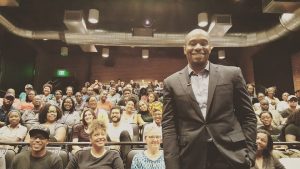
On the evening of Sept. 29, author, journalist and professor Marc Lamont Hill spoke to a standing room only crowd in Duke University’s Full Frame Theater on the American Tobacco campus.
Hill, a Distinguished Professor of African American Studies at Morehouse College, was in conversation with African and African American Studies professor Mark Anthony Neal, the director of the Center for Arts Digital Culture and Entrepreneurship. Their conversation hinged on Hill’s latest book, “Nobody: Casualties of America’s War on the Vulnerable, From Ferguson to Flint and Beyond.”
Hill who is currently the host of BET News and VH1 Live as well as a political contributor to CNN, talked about being among the first reporters to arrive in Ferguson, Mo., following the police killing of teen Michael Brown in 2014.
He talked about the “ordinariness of state violence” against people who are perceived as politically vulnerable and disposable, such as those in New Orleans following Katrina and those in Flint where drinking water was contaminated.
“In Flint we are witnessing this young century’s most profound illustration of civic evil, an entire city collectively punished with lead poisoned water for the crime of being poor, black and politically disempowered,” Hill said, reading a passage from his book.
“These conditions reflect the prevailing belief that the vulnerable are unworthy of investment, protection and the most fundamental provisions of the social contract. As a result, they can be erased, abandoned and even left to die,” said Hill. “That is state violence.”
“It doesn’t happen in Grosse Pointe, Michigan,” Hill said.
The conversation continued with Hill offering comment on sports and politics.
On Colin Kaepernick’s kneeling protest against the Star-Spangled Banner, Hill said at least other athletes are supportive. “Muhammad Ali had to stand alone,” he said.
“I am finding (Trump’s) campaign is dangerous, patriarchal and homophobic and often uninformed by things like data,” said Hill, noting the increasing racism and xenophobia in the U.S. “I think there is a nostalgia for moments that never were what we think they were.”
He made parallels between the concerns of the Black Lives Matter social movement in the U.S. with the plight of oppressed people such as Palestinians. A cultural anthropologist by training, Hill is currently making monthly trips to Israel where he is researching a book on Afro-Palestinians.
Hill also discussed the “lonely and solitary” life of being a public intellectual.
“I have to live a life of discipline. I read every day. I write every day,” Hill said. “That’s a lesson for students. To be productive as a scholar you have to write every.”
Hill, who has appeared on CNN, FOX News, VH1 and BET, said that although he’s interested in engaging with academic work, but also interested in reaching new audiences and stretching the idea of “academic rigor.”
“I enjoy doing other things. There’s a weird thing in the academy where you can only be good at one thing,” said Hill who is a cultural anthropologist by training. “There’s a self-imposed marginality of the intellectual when you challenge masculinity and do risky intellectual projects.”
Although he uses popular television as a platform, he seizes the opportunity to put forth academic ideas about state violence and patriarchy.
“I’m not trying to smuggle everything in under the academic canopy,” he said.




